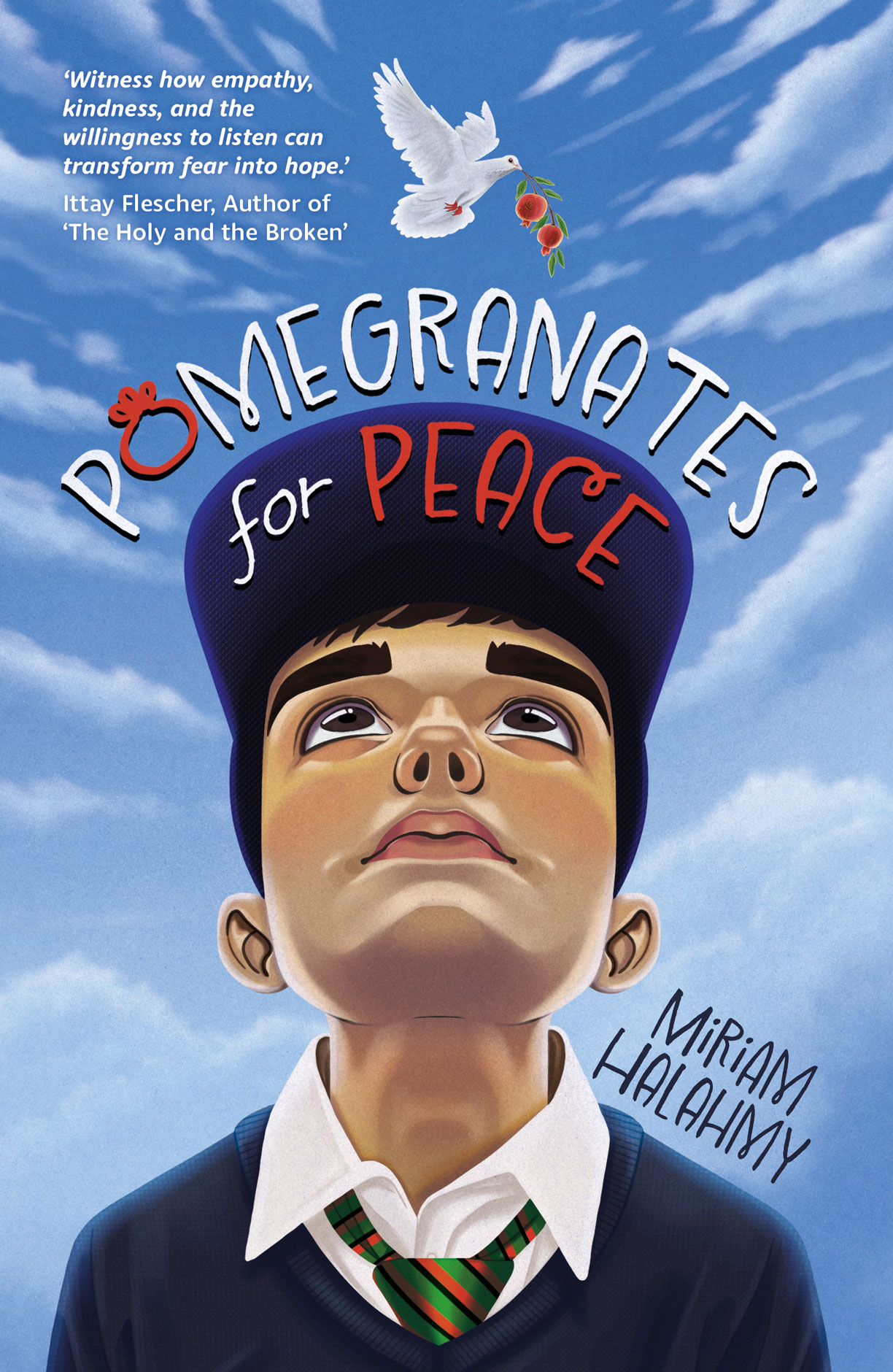
Ever since October 7th things have not been so good at 12- year-old Tamara Cohen’s house. Dad is angry and upset and Mum is snappy and even little sister Eden is anxious and worried. Then to top it all, Dad announces that Gidi, Tamara’s cousin is coming to stay and that he will be using Tamara’s bedroom. Dad and Tamara fall out and to make matters worse, Gidi’s strange behaviour at school soon attracts the attention of bullies, Lola and Dean. As the war between Israel and Gaza deepens, so do divisions at school, including the teachers and within Tamara’s friendship group. Tamara’s best friend Yazmin stops talking to her and a swastika appears on Tamara’s locker. Lola and Dean create a football match with one side playing for Israel and the other for Palestine and Tamara begins to despair that nothing will ever be the same again. Then Gidi tells her and the whole school about his club back home, Pomegranates for Peace where Israeli Jews and Israeli Arabs and Muslims come together to build bridges of understanding, where all people are equal and can live in peace, and slowly his words begin to make a difference. A story of hope, healing and finding common ground in the hardest of times. Miriam Halahmy is an award- winning Anglo-Jewish author and Peace Activist.
When a real-world event is so polarised, it’s hard to imagine how a book for younger readers could provide a balance of perspectives. Meticulously researched, Miriam Halahmy’s Pomegranates for Peace provides a challenging, but sensitive narrative about young students trying to make sense of events following October 7th. Through its likeable characters, we are introduced to a range of authentic experiences and perspectives that also open up broader themes of racism and religious discrimination. Ultimately, the theme of peace shines through, with the aim of bringing a sense of hope for younger readers. Strongly recommended for teachers to use in the classroom to open up meaningful discussion.
/ Jane Yates Educational Consultant RE
I have just finished it and it made me cry twice. It is a perfect and important MG book, taking a very complicated situation and, in creating this particular story, you make it manageable for children. You inject hope into what seems an intractable situation happening very far away and show how someone, anyone can effect positive change. You take something foreign and make it British, and thus relatable. And this is helpful for all children with complicated identities. It hard to understand why one feels British and yet connected to Israel/Pakistan/Jamaica/wherever. So many children have these feelings and they are confusing in times of peace. But when there is a war all sorts of other feelings get involved; isolation, anger, despair. And you look tribalism square in the face, in all of its flattening one-dimensionality and dehumanisation, and reveal its negativity and power, and attractiveness especially for children, who want so badly to belong. And you manage a happy ending and one which is believable at least in Abbey Wood School. Thank goodness! Thank you for managing a happy ending.
/ Joanna de Guia : Educator, former librarian and bookseller.
What a moving and vivid story. Telling children what it feels like to be a modern British Jewish girl of twelve, trying to deal with the rise of anti-Semitism and confused loyalties of friends, and with a close-knit family supporting a traumatised Israeli cousin, is all painfully topical. I found Tamara and her group of friends very believable, and my heart broke for Gidi.
/ Amanda Craig, Author, critic and journalist.
Pomegranates for Peace refuses easy answers or political slogans, instead inviting readers to witness how empathy, kindness, and the willingness to listen can transform fear into hope. With honesty and grace, Halahmy reminds us that peace is not just a distant dream, but a daily practice—nurtured in bedrooms, schoolyards, and the quiet moments between friends. A vital story for young people everywhere, and for anyone who believes that bridges can be built, even in the most challenging times. Through the unshakable bond between Jewish Tamara and Muslim Yazmin – a friendship forged not in ideological agreement but in the quiet soil of neighbourhood sidewalks and sleepover chair beds – Halahmy rejects political binaries to reveal how peace grows through small acts of kindness and mercy.
/ Ittay Flescher Author of 'The Holy and the Broken: A cry for Israeli-Palestinian peace from a land that must be shared.
Tamara learns how to use her hot chilli temper for good to help dispel prejudice from both adults and other students in her school and community. A sweet and inspirational story of friendship, family, and the importance of taking the lead and working towards peace and understanding. The message that really came through in the book for me was about not taking sides. So many issues are presented as being black and white without context or nuance. Finding out about the terrifying experiences of people from Gidi and Keren and Omer and Farrah makes the situation real and immediate. It is very important to be reminded of what people have gone through, on and since October 7th.
/ Julie Loy -School Librarian, Stoke Newington
Life Challenges
- Anger and not knowing how to manage it
- Challenges at school
- Challenges with family
- Dealing with feelings of anxiety
- Displacement
Themes
- Bullying
- Challenges at school
- Community
- Dealing with change
- Grief
What's Great?
- Absorbing plotline
- Character driven
- Curriculum focused
- Emotional journey
- Group discussions